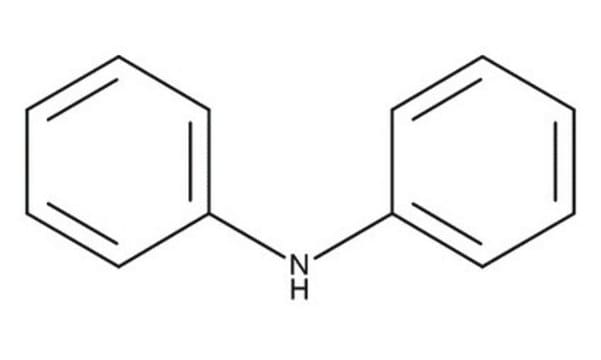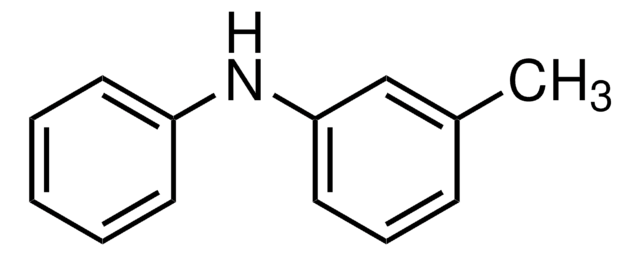CRM69121
Diphenylamine
certified reference material, TraceCERT®, Manufactured by: Sigma-Aldrich Production GmbH, Switzerland
About This Item
Recommended Products
grade
certified reference material
TraceCERT®
Quality Level
vapor density
5.82 (vs air)
vapor pressure
1 mmHg ( 108 °C)
product line
TraceCERT®
autoignition temp.
1175 °F
shelf life
limited shelf life, expiry date on the label
manufacturer/tradename
Manufactured by: Sigma-Aldrich Production GmbH, Switzerland
bp
302 °C (lit.)
mp
50-53 °C (lit.)
format
neat
SMILES string
N(c1ccccc1)c2ccccc2
InChI
1S/C12H11N/c1-3-7-11(8-4-1)13-12-9-5-2-6-10-12/h1-10,13H
InChI key
DMBHHRLKUKUOEG-UHFFFAOYSA-N
Looking for similar products? Visit Product Comparison Guide
General description
Certified content by quantitative NMR incl. uncertainty and expiry date are given on the certificate.
Download your certificate at: http://www.sigma-aldrich.com
Diphenylamine is a fat-soluble organic antioxidant, widely used to control post-harvest skin scalding in apples and pears by preventing the oxidation of α-farnesene.
According to the Commission Implementing Regulation (EU) No 578/2012 of 29th June 2012, diphenylamine is not approved for use in the European Union (EU) as an active substance in the plant protection products, following the Regulation (EC) No. 1107/2009. But a default maximum residue limit of 0.05 mg/kg is allowed for its presence in the products of plant and animal origin as per the EU Reg. 2018/1515.
Application
Diphenylamine CRM may also be used as given below:
- Development and validation of a gas chromatography-mass spectrometry (GC-MS) method for the simultaneous analysis of diphenylamine, tolylfluanid, propargite, and phosalone in human liver samples
- Determination of diphenylamine residues in fruit samples after applying a combination of supercritical fluid extraction (SFE) and supramolecular solvent-based microextraction (SSME) for the extraction, followed by a determination using high-performance liquid chromatography (HPLC) with ultraviolet (UV) detection
- Evaluate a newly designed molecularly imprinted polymer (MIP) based on β-cyclodextrin (β -CD) and graphene oxide (GO) for the determination of diphenylamine
- Analysis of diphenylamine in apple samples using an electrochemical sensor based on phosphomolybdic acid (PMo12) and graphene oxide (GO)
- Investigate the performance of an electrochemical sensor founded upon polymeric carbon-rich graphitic carbon nitride (C-gCN) to detect diphenylamine in apple juice samples
- Study the determination of diphenylamine in apple and pear samples using an electrochemical sensor based on Copper@nanoporous carbon (Cu@NPC) as the electrode material
Other Notes
The collision cross section (CCS) measurement was provided by Waters Corporation, using the SYNAPT XS mass spectrometer.
For a description and overview of how ion mobility enables the measurement of the CCS of an ion visit ims.waters.com.
Further information on the SYNAPT XS mass spectrometer can be found on the IMS microsite and product webpage.
TWCCS measurements are expected to be within 2% of this reference value.
P/N CRM69121 is part of the Waters Extractables & Leachables UNIFI scientific library which can be downloaded from Waters Marketplace.
Recommended products
Legal Information
Not finding the right product?
Try our Product Selector Tool.
Signal Word
Danger
Hazard Statements
Precautionary Statements
Hazard Classifications
Acute Tox. 3 Dermal - Acute Tox. 3 Inhalation - Acute Tox. 3 Oral - Aquatic Acute 1 - Aquatic Chronic 1 - STOT RE 2
Target Organs
Kidney,Liver,spleen
Storage Class Code
6.1C - Combustible acute toxic Cat.3 / toxic compounds or compounds which causing chronic effects
WGK
WGK 3
Choose from one of the most recent versions:
Certificates of Analysis (COA)
Don't see the Right Version?
If you require a particular version, you can look up a specific certificate by the Lot or Batch number.
Already Own This Product?
Find documentation for the products that you have recently purchased in the Document Library.
Our team of scientists has experience in all areas of research including Life Science, Material Science, Chemical Synthesis, Chromatography, Analytical and many others.
Contact Technical Service







